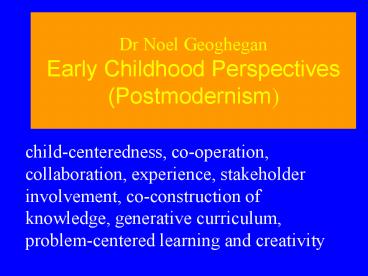Dr Noel Geoghegan Early Childhood Perspectives Postmodernism - PowerPoint PPT Presentation
1 / 23
Title:
Dr Noel Geoghegan Early Childhood Perspectives Postmodernism
Description:
Notions such as Platonic logicism, Cartesian ... debates over the origin of knowledge, either as a pre-existing external object ... Positivism under question ... – PowerPoint PPT presentation
Number of Views:113
Avg rating:3.0/5.0
Title: Dr Noel Geoghegan Early Childhood Perspectives Postmodernism
1
Dr Noel GeogheganEarly Childhood
Perspectives(Postmodernism)
- child-centeredness, co-operation, collaboration,
experience, stakeholder involvement,
co-construction of knowledge, generative
curriculum, problem-centered learning and
creativity
2
Postmodernism
- Whitehead (1967) Any serious fundamental change
in the intellectual outlook of human society must
necessarily be followed by an educational
revolution.
3
Century old roots
- Notions such as Platonic logicism, Cartesian
rationalism and Calvinistic practices and beliefs
dominate the current world view. - debates over the origin of knowledge, either as a
pre-existing external object or as an object
created through experience from sense perceptions
or experimentation.
4
Modernist roots
- Education also has a heritage rooted in the
testing movement - to establish standards - It is from these roots that the analytical
scientific model became the paradigm for
education in the modern era.
5
Hard sciences
- The "mathematical golden age" was a reflection of
the reverence attached to the hard sciences such
as physics and mathematics, for example, for
their capacity to quantify and explain reality
6
Positivism under question
- the education community has begun to question the
justification and validity of the scientific
research paradigm with its enterprise for
objective measurement in educational settings. - learning develops out of an individual's
activities which are socially and experientially
based, local and specific in nature
7
Current-day pedagogy ordains that the teacher has
the authority
- The learner, to a large degree, loses control
- Prevailing Western views of education maintain a
vice-like grip in relentlessly perpetuating its
domination
8
the individual or mental process "in vacuo"
- psychology has for the last 100 years been
quintessentially a psychology of the individual
organism - principles of separation, decontextualization and
fragmentation continue to underpin learning
experiences.
9
The times they are a-changin'
- Dewey (1922) encouraged fundamental classroom
reform
10
New possibilities
- Modernist (or positivist) and postmodernist views
are belief systems that are virtually opposite. - Postmodernist views deny the existence of an
objective reality
11
- Notions of postmodernism are reflected in the
writings of Piaget, Vygotsky, Dewey, and Mead,
and are based on the idea that knowledge is what
a rational self-organizing being creates as part
of an interacting system. - The basic premise being that social conditions
and individual minds and selves are fundamentally
influenced each by the other
12
focusing on the classroom environment
- one is forced to recognize the connections
between what a person does, feels, thinks, and
believes the constraints and supports provided
by other people and artifacts in that particular
setting and cultural rules, norms and values
13
the creation of power of self-control
- Bruner (1966) increasingly recognized that most
learning in most settings is a communal activity,
a sharing of culture and Piaget (1973) emphasized
the social aspects of teaching and learning as
strictly necessary for the mental development
that is called education.
14
Modern to postmodern changes
- M
- O
- D
- E
- R
- N
- POSTMODERN
15
- postmodern theoretical trajectories take as
their entry point a rejection of the deeply
ingrained assumptions of Enlightenment
rationality, traditional Western epistemology, or
any supposedly "secure" representation of reality
that exists outside of discourse itself...
16
Postmodernism venerates language, rather than
thought
- Nietzsche, Kierkegaard and Wittgenstein -
demonstrated that language is inherently
ambiguous and that the truths of reason, which
must employ language, must thus be ambiguous as
well. When language, rather than reason, is taken
as the fundamental model of how the world works,
an alternative set of themes moves into
prominence
17
Elkind (1998)
- asserts that schools, if not teachers and/or
pedagogy, are in the midst of a major
transformation - independent of any conscious
reform agenda - simply in response to changes in
the society and in the family
18
Glickman (1985)
- the only alternative for a teacher in a complex
environment who cannot adjust to multiple demands
and is not being helped to acquire the abilities
to think abstractly is to simplify and deaden the
instructional environment.
19
(No Transcript)
20
children's freedom to interact with each other as
well as with the teacher
- child-centered domain
- learning as a socially interactive experience
- construction of knowledge would be viewed as a
creative, inventive process
21
sharing ideas and negotiating as problem solvers
- During all lessons throughout the day children
would be encouraged to discuss their concerns,
insights, and resolutions in responsible
problem-solving collaboration - the problem-solving approach would aim to develop
positive and responsible dispositions towards
learning for the entire day with a focus on
respectful appreciation of every person's
capacity to contribute and participate
22
Elkind (1998)
- .suggests what we need most of is not more
reform, but rather more recognition and support
for what our education systems are already
experiencing in a postmodern transformation.
23
Reggio Emilia
- The Reggio Emilia approach (from Italy)
- exemplifies postmodern principles of
- child-centeredness, co-operation,
collaboration, hands-on experience, stakeholder
involvement, co-construction of knowledge,
generative curriculum, problem-centered learning
and creativity































